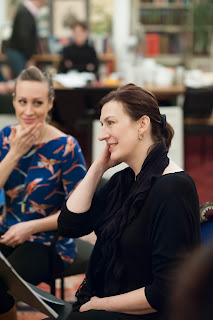 | ||
| Brenda Rae and Sarah Connolly in rehearsal for Fantasio credit Russell Duncan |
In a brief history of Fantasio Jean-Christophe Keck describes why Fantasio was a flop at the time. Based
on Alfred de Musset's 1834 play it appeared to be doomed. Musset himself had
fallen out of popular favour and Offenbach’s reputation was
affected by the recent Franco-Prussian War (1870-1). A lack of
support from the co-director (Camille du Locle) of the Opéra-Comique
meant that Fantasio closed after ten performances.
Jacques Offenbach (1819-1880) born in
Deutz near Cologne studied at the Paris conservatoire (1833-7)1
and began playing cello at the Opéra-Comique
(1849-55). During this time he began to write operettas which he
called Bouffes Parisienes. Writing over 90 of these during the next
25 years including Orphée aux enfers (1858) and La belle
Hélène (1864), his career culminated in the well-known Les
contes d'Hoffmann (1877-80) which was produced only after his
death.
As a medium, Opéra bouffe was highly influential, influencing the development of comic opera in England, Vienna and the US such as Johann Strauss’ Die Fledermaus (1874) and Gilbert and Sullivan’s operettas written in the 1870/80s.
While generally simple in form, rhythm,
texture and harmony their appeal lies in their wit, satire, parody
and farce and Fantasio is no different. It has thwarted love,
mistaken identity, a fool, escape from prison, political mob scenes,
and a strong anti-war stance. But putting on Fantasio has taken
dedication and a research project.
 |
| Sir Mark Elder rehearsing Fantasio, credit Russell Duncan |
The role of Fantasio was originally
written for a tenor but the departure of Victor Capoul to America and
the insistence of Camile Du Locle made Offenbach rewrite the role for
mezzo-soprano. Sarah Connolly performed admirably in this role. Her acting and lyrical
singing made this impish character shine. The choice of Brenda Rae to fill the role of Elsbeth (La princesse) was perfect. Her
voice blended beautifully with Sarah’s in their duets and on her
own brought the opera to a halt at the end of her stunning
‘laughing’ solo as the audience went wild.
Despite this being a concert
performance all the cast members acted as well as if they were in a
stage production. The singing was first rate all round, and having
the orchestra on stage gave traditional opera goers a chance to see
what goes on in the pit. Mark Elder not only conducted but joined in the singing with his own
solos. Little touches such as sound effects added to the impression
of a performed opera.
The men had less chance to shine than
the ladies but made the most of their parts. Baritone Russell Braun gave the obnoxious prince, who is incapable of maintaining
the clothes-swapping role he had planned with his servant Marinoni
(Robert Murray), an insecure and lonely side. Similarly, half way through
act three Marinoni has a strange solo singing about the pink coat
that he has to return to his master as they swap clothes back.
Presumably this solo was originally there to show off the tenor voice
of whoever Offenbach had cast in the role. Here Murray made it his
own, showing reluctance to hand back to the coat and return to his
life as a servant.
 |
| Neal Davies rehearsing Fantasio, credit Russell Duncan |
The plot of Fantasio is a little
weak towards the end. You want Fantasio to ride off into the sunset
with Elsbeth but this does not happen. There is also no real
explanation of why Elsbeth was originally in love with Saint Jean
(the fool that Fantasio impersonates). Perhaps for Offenbach the main
message was anti-war and once Fantasio had prevented the war between
Bavaria and Mantua he did not care that much if the main protagonists
completed their love scene or not.
As an experiment in resurrecting a
forgotten opera Fantasio was a resounding success. I would
really like to see this performed on stage somewhere with great
contrasts in scenery to enhance the performance.
Reviewed by Hilary Glover
Elsewhere on this blog:
- WIN an evening with Divas and Scholars: History of Opera
- Tallis Scholars at Temple Winter Festival
- Intensely moving: Poulenc's Carmelites at Theatre des Champs Elysees, Paris
- Magical: My Fair Lady at the Chatelet Theatre, Paris
- Rare and wonderful: Lawrence Zazzo in Handel, Bononcini and Ariosti
- Stunning: Beethoven's Missa Solemnis from John Eliot Gardiner
- Hilliard Ensemble's 40th birthday party
- War and Peace: Music for Remembrance Choir of Jesus College, Cambridge - CD review
- National Children's Orchestras at the Royal Festival Hall
- Christmas at the Chapel Royal Alistair Dixon and Chapelle du Roi
- Two Dutchmen: Marc Minkowski and Les Musiciens du Louvre Grenoble perform Wagner and Dietsch - CD review
- Les Apotheoses Christophe Rousset and Les Talens Lyriques
- Mark Padmore & Heath Quartet - Tippett Songs and Quartets
- The Barber of Neville - Howard Blake concertos - CD review
- Christmas Sparkle with Voces8 and Edition Peters
- Home







.jpg)
%20TallWall%20Media_Oxford%20Song.jpg)

%202025%20%C2%A9%20Mark%20Douet.jpg)
No comments:
Post a Comment